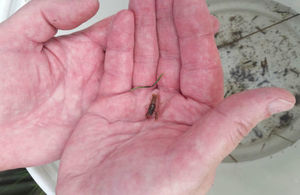Native crayfish make a comeback in Lincolnshire
The first transfer in the county of white-clawed crayfish has been hailed a success as the protected species is now breeding in its new location.

This baby white-clawed crayfish was found during surveying of the chalk stream, showing the species is now breeding in its new home
A threatened species of crayfish is making a comeback in Lincolnshire thanks to efforts by the Environment Agency and local conservation groups.
Last July, 600 white-clawed crayfish were moved from locations in the River Witham – where they’re at risk of being wiped out by invasive signal crayfish – to new remote locations including a chalk stream in the Lincolnshire Wolds.
Now, surveys show the transfer – the first in the county – has been successful, and the crayfish have started to breed.
Native white-clawed crayfish have been in decline since non-native American signal crayfish escaped into UK waters in the 1970s. These larger, invasive crayfish outcompete native species for food and habitat and carry a disease fatal to the UK species.
But working with partners such as the Lincolnshire Chalk Streams Project (LCSP) and the Lincolnshire Wildlife Trust, the Environment Agency is seeking to secure their future by relocating them to areas free of the invaders in a scheme known as the ‘ark project.’
Richard Chadd, senior environmental monitoring officer with the Environment Agency said:
These crayfish are a vital part of our ecology, so preserving them is yet another example of how we’re protecting our environment for the future.
Having personally worked on this project – physically picking up these crayfish, measuring them, checking their health and relocating them to their new homes – I’m thrilled that our efforts at protecting them have been so successful.
Previously the crayfish were only present in two locations in the county, so we’ve potentially doubled their habitat in the space of a year – and Lincolnshire’s rare, protected chalk streams are the perfect home. They’re remote, clean, and the water is high in calcium, which helps crayfish form strong exoskeletons and makes them more robust.
Ruth Craig, Lincolnshire Chalk Streams Project Officer, said:
The Lincolnshire Chalk Streams Project jumped at the chance to support this EA-led initiative to establish native white-clawed crayfish sites in the chalk streams of the Lincolnshire Wolds.
We offered up some potential sites and once they were all assessed, we were excited to hear one of the chalk streams had scored as highly suitable.
We worked closely with local landowners to secure access and their long-term support in protecting the area from disturbance, and we will return to monitor the populations as needed. But the hard work doesn’t end here – we plan to continue identifying further possible locations, supporting the work of the EA.
White-clawed crayfish, named for the pale colour of the underside of their claws, are the country’s largest native freshwater crustaceans. Generally growing to 30 – 40mm in length, some can live up to 12 years and reach 120mm long from tip to tail.
Collectively, non-native invasive species cost the UK economy an estimated £1.7b every year. Everyone can do their part to prevent the spread of invasive species and protect native ones by taking care to follow the biosecurity steps of thoroughly checking, cleaning and drying your clothes and equipment any time you’ve been in the water. You can get more information from the Non-native Species Secretariat.